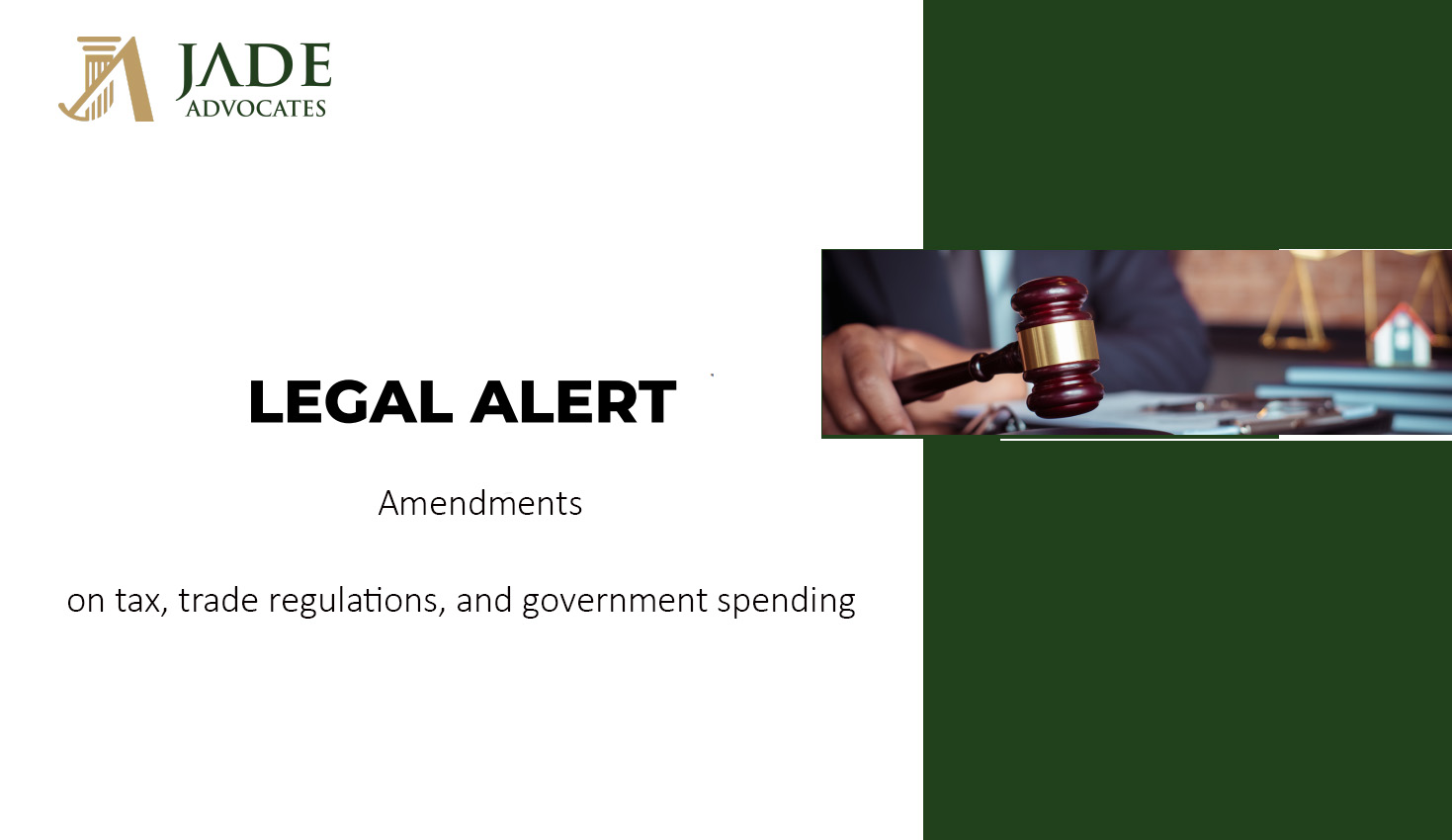The President recently signed several bills into law, strengthening our tax system, trade regulations, and government spending, all effective 1st July 2025.
Here are some snippets of the relevant changes in the tax laws.
THE INCOME TAX (AMENDMENT) (NO. 2) ACT, 2025
• This amends the Income Tax Act, Cap. 338, introducing important changes including:
• Three-year tax exemption for startup businesses: New businesses established by Ugandan citizens after 1 July 2025 will be exempt from income tax for a period of three years, provided that:
• The business is registered with an investment capital not exceeding UGX 500 million.
• The citizen or their associate has not previously benefited from this exemption.
• The citizen files tax returns, including the business information return as prescribed by the Commissioner General.
• The three-year tax holiday encourages formalization and growth of startups by reducing early-stage tax burdens, fostering innovation and job creation.
• The exemption for startups requires filing of tax returns and business information, promoting transparency and formal tax administration and compliance.
• The income tax exemption for the Bujagali Hydro Power Project is extended to 30 June 2032 (previously expiring 30 June 2024), supporting affordable electricity tariffs benefiting consumers and businesses
• Inclusion of International Atomic Energy Agency (IAEA) as a listed institution: The IAEA is now prescribed as a listed institution under Schedule 2 of the Income Tax Act, affecting its tax treatment.
• The amendment clarifies that tax exemptions on chemicals apply to those manufactured for agricultural or industrial use, refining the scope of the exemption thus reduces ambiguity, aiding manufacturers in compliance.
THE STAMP DUTY (AMENDMENT) ACT, 2025
• This amends the Excise Duty Act, Cap. 336, with two key changes:
• The Act introduces a provision allowing taxpayers to apply for remission (refund or credit) of excise duty paid on damaged, expired, or obsolete goods. To qualify, the applicant must submit proof of duty payment, delivery documentation, and a report from a competent authority confirming the damage or obsolescence. The Commissioner for Excise Duty may then reduce other excise or tax liabilities accordingly or credit outstanding tax liabilities on request.
• The Act revises excise duty rates on several goods, including:
Tobacco products: Increased rates for locally manufactured and imported cigarettes (e.g., soft cap cigarettes duty raised to Ushs. 65,000 locally and Ushs. 150,000 imported per 1000 sticks).
• Beer: Duty on beer with at least 75% local raw material content is set at 30% or Ushs. 900 per litre, whichever is higher.
• Fruit and vegetable juices: Duty of 10% or Ushs. 250 per litre, except for juices made from at least 50% pulp from locally grown produce.
• Motor spirit (gasoline): Ushs. 1650 per litre.
• Gas oil (automotive diesel): Ushs. 1380 per litre.
• Plastics: Duty on certain plastic sacks and bags at 2.5% or USD 70 per tonne, whichever is higher, with exemptions for vacuum packaging and sanitary pad manufacturing bags.
• With this amendment, we see the aspect of financial relief for damaged goods. Businesses can recover excise duty paid on goods that become unsellable due to damage, expiry, or uselessness, improving cash flow and reducing losses.
• The revised rates also reflect government policy to encourage local raw material use, adjust for inflation, and align excise duties with economic goals.
• In conclusion, importers, manufacturers, and distributors must update their accounting and pricing to reflect new excise rates and understand the process for claiming remission.
THE VALUE ADDED TAX (AMENDMENT) ACT, 2025
• This introduces several important amendments to the VAT Act, Cap. 344, aimed at improving tax compliance, supporting local industry, and promoting environmental sustainability. The key changes include:
• Anti-fragmentation rule for imported goods: The Act targets importers who split shipments into separate consignments to avoid VAT registration thresholds. If aggregated, these consignments will trigger mandatory VAT registration for the importer, even if individual consignments fall below the threshold. This anti-fragmentation rule closes loopholes where importers avoid VAT registration by splitting imports, enhancing tax compliance and revenue collection.
• Biomass pellets and solar lanterns are exempted from VAT to encourage cleaner energy solutions and environmental sustainability. Additionally, certain textile inputs (e.g., cotton lint, garment accessories, textile dyes, machinery spare parts) are proposed for VAT exemption to boost local textile manufacturing and industrialization.
• The supply of aircraft supplies is zero-rated under the VAT regime, reducing costs for the aviation industry, encouraging investment in the aviation sector.
• United Nations related agencies and specialized agencies are prescribed as listed institutions, potentially affecting their VAT treatment.
THE TAX PROCEDURES CODE (AMENDMENT) ACT 2025
• This introduces significant amendments to the Tax Procedures Code Act, Cap. 343, focusing on improving tax administration, compliance, and integration of taxpayer identification systems. The key changes include:
• Use of National Identification Numbers (NIN) and Registration Numbers as Tax IDs:
• Individuals will use their National Identification Number (NIN) issued by the National Identification Registration Authority (NIRA), while non-individuals (companies, entities) will use their registration number issued by the Uganda Registration Services Bureau (URSB) as their tax identification numbers. Taxpayers must state these numbers on all tax returns, notices, and communications. This aims to enhance data consistency and improve inter-agency information sharing.
• Using NIN and URSB registration numbers as tax IDs promotes accurate taxpayer identification and reduces duplication. URSB will establish and maintain a centralized register of all non-individuals registered or carrying on business in Uganda, facilitating better taxpayer tracking and compliance.
• Linking Tax Identification to Business Licensing: Local authorities, government institutions, and regulatory bodies are prohibited from issuing licenses or authorizations for conducting business in Uganda to any person or entity without a valid NIN (for individuals) or registration number (for non-individuals). This strengthens enforcement of tax registration. Thus, ensures that only compliant taxpayers can legally operate, reducing informal business activities
• The Act introduces a waiver of outstanding interest and penalties as of 30 June 2024, provided taxpayers pay the outstanding principal tax by 30 June 2026. This measure encourages taxpayers to clear principal tax arrears and benefit from relief on accrued penalties and interest. It also improves revenue collection while easing financial burdens.
• The Act provides for a centralized payment gateway system for gaming and betting operators, including penal taxes for failure to integrate or comply with this system, enhancing transparency and tax collection in this sector. This is aimed to curb tax evasion and increase revenue from gaming and betting activities.
THE EXTERNAL TRADE (AMENDMENT) ACT, 2025
• This amendment revises regulations on international trade, aiming to promote exports, regulate imports, and align with global trade standards.
• The amendments impose:
–An infrastructure levy of 1.5% on the customs value of all goods imported for home use, unless specifically exempted for instance goods in the Fifth (5th) schedule to East African Community Customs Management Act (EACCMA), 2004, Plant/machinery (Chapters 84 & 85 East African Community Common External Tariff (EAC CET) ), and goods under special operating frameworks with the Government.
• A 1% import declaration fee on all goods imported for home use, with certain exemptions like Goods exempted from customs duty under the EACCMA Fifth (5th) schedule.
• An export levy of USD 10 per metric tonne on wheat bran, cotton cake, and maize bran consigned out of Uganda no exemptions specified.
• These new levies will raise the cost of importing goods for home use, especially for those not covered by exemptions as this is expected to encourage local sourcing and support Uganda’s “Buy Uganda, Build Uganda” (BUBU) initiative.
• On the other hand, exporters of wheat bran, cotton cake, and maize bran will face higher costs, potentially reducing demand for these products in foreign markets and increasing their availability for value addition within Uganda. Having stated the above, importers as well as exporters must adjust their pricing, contracts, and compliance processes to account for the new levies and fees.
THE HIDES AND SKINS (EXPORT DUTY) (AMENDMENT) ACT, 2025
• The Act repeals sections 2(3) and section 4(2).
• The Act also repeals Schedule 2 of the original Hides and Skins (Export Duty) Act, removing prior exemptions and standardizing the export duty regime.
• This law updates export duties on hides and skins, supporting value addition, local industry growth, and improved regulation of exports.

